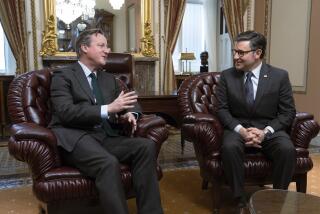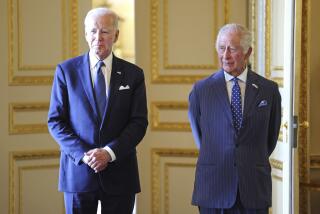McCain talks war, avoids conflict
- Share via
LONDON — Sen. John McCain on Thursday conceded that the British public is “frustrated” over the war in Iraq, but warned that the battle is not won despite recent improvements in the security situation.
“The fact is Al Qaeda is on the run. They are not defeated; they are not defeated. And we’re going to have to continue training Iraqi military and doing what we’ve been doing,” McCain said after meeting with British Prime Minister Gordon Brown during a foreign policy swing through the Middle East and Europe.
The meeting was seen in Britain as a chance to build bridges with a U.S. presidential hopeful who has been critical of Britain’s troop drawdown in southern Iraq.
McCain was not openly chastising in his public remarks, instead expressing gratitude for Britain’s contribution to the war effort. And there are growing signs of doubt in London about how fast Brown might be able to withdraw troops. Britain plans to soon begin reducing its force from the present level of 4,100 soldiers toward the target of 2,500.
“There’s a huge amount of progress still to be made in Basra, and without a transformation of the political scene in Basra and a transformation of the Iraqi police, the goal of economic rebirth of Basra, and therefore of Iraq as a whole . . . will be difficult to achieve,” James Arbuthnot, chairman of Parliament’s Select Defense Committee, told foreign reporters before McCain’s visit.
He said Brown’s announcement in October of the troop withdrawal left “leeway” for a delay to ensure that forces are sufficient to defend themselves and train Iraqi forces.
McCain last month was quoted in Britain’s Daily Telegraph as saying that the British decision to pull back to a single base at Basra airport was premature.
“Obviously I would like to have seen them stay longer and larger. At the time, I didn’t think it was a good idea, but I understood the domestic British political situation,” McCain said then.
On Thursday he declined to be drawn out further.
“I fully appreciate that British public opinion has been frustrated by sometimes a lack of progress in both areas,” he said, referring to Iraq and Afghanistan. “But all I can do is express my gratitude to the British government and people, especially the brave young people who are serving.”
McCain also would not lay out distinctions between his foreign policy and that of President Bush, asserting that his trip was not as a candidate but as part of a Senate Armed Services Committee delegation, with Sens. Joe Lieberman (I-Conn.) and Lindsey Graham (R-S.C.).
Later in the day, McCain, the presumptive Republican presidential nominee, briefly put back on his campaigning hat for a $1,000-a-plate fundraiser for Americans living in Britain at the elegant Spencer House, built for an ancestor of the late Princess Diana.
His official meetings also included David Cameron, Britain’s opposition Conservative Party leader, and Stavros Dimas, the European Union environment commissioner. Establishing the U.S. as a leader in slowing climate change has been a priority for McCain.
McCain was scheduled to meet today with French President Nicolas Sarkozy in Paris.
For Britain, the importance of McCain’s visit appears to have increased with the perception here that Democratic infighting raises the likelihood that a Republican could again be the partner in what Britain sees as its most important foreign policy relationship.
“Bottom line, until he becomes president, he’s not that important,” said Michael Cox, an expert on transatlantic relations at the London School of Economics.
“But the fact the Democrats are so divided now means he’s a more important person to talk to.”
--
More to Read
Get the L.A. Times Politics newsletter
Deeply reported insights into legislation, politics and policy from Sacramento, Washington and beyond. In your inbox twice per week.
You may occasionally receive promotional content from the Los Angeles Times.










